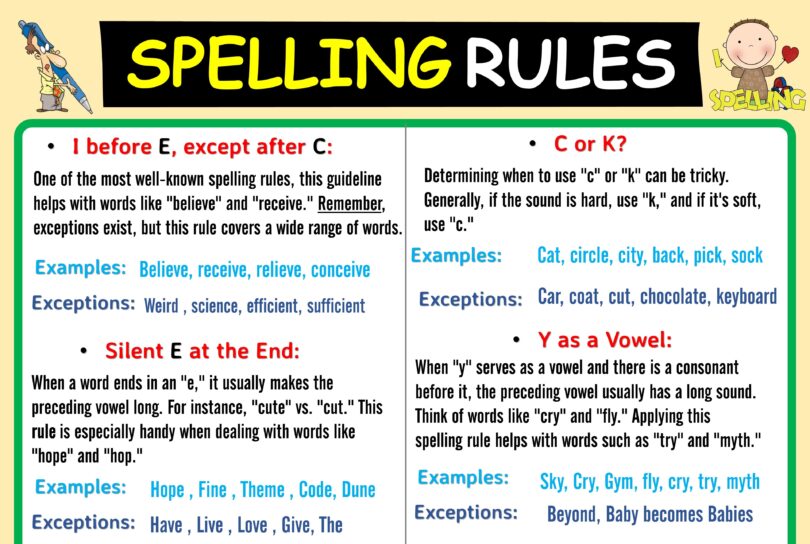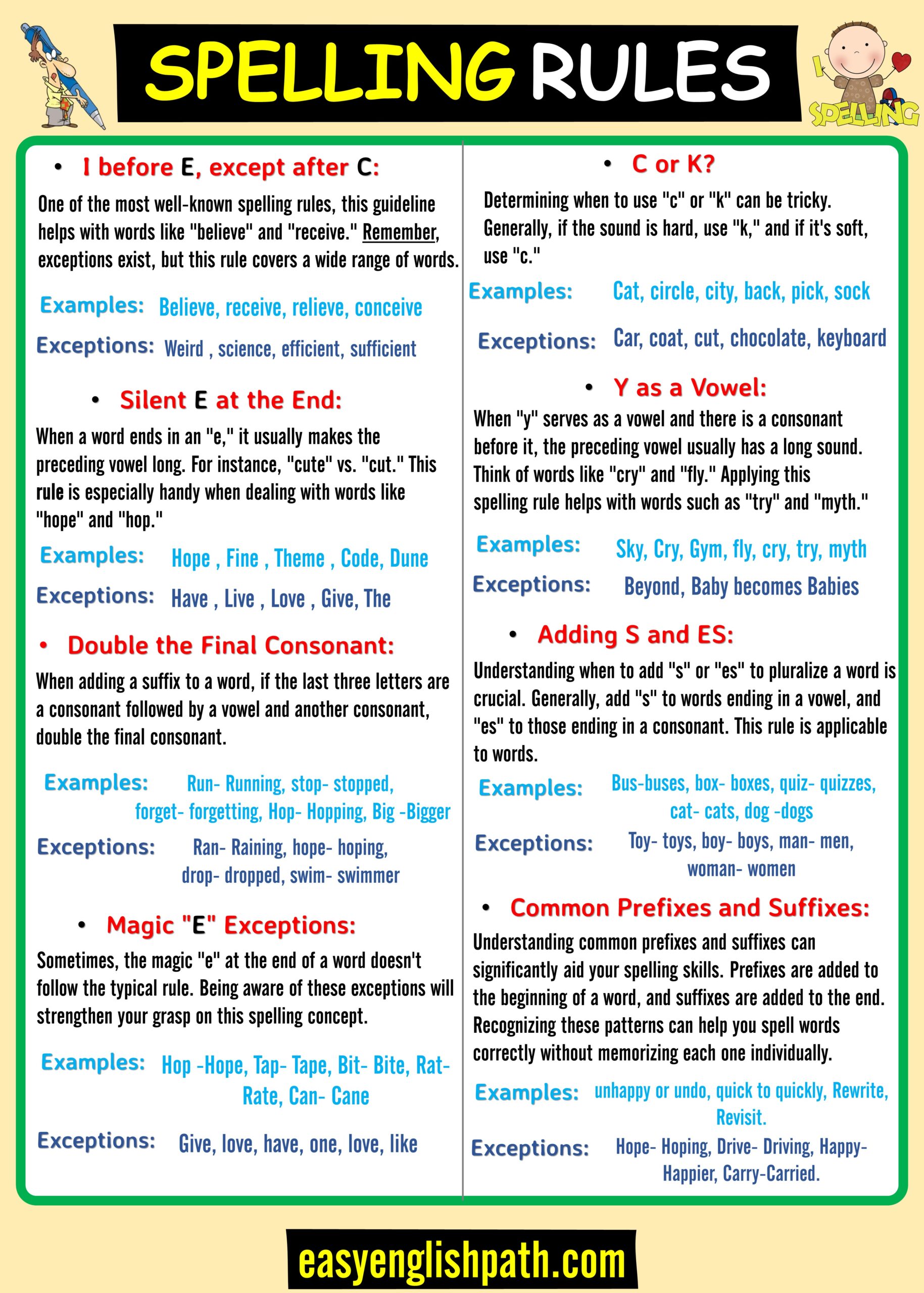Spelling rules help us write words right. They play an important role in assisting us to write words correctly. In the English language, we have to come across such a situation that we might sometimes misspell a word and that happens only when we are not aware of the complete spelling rules. it is also important to note that there are also many exceptions which we need to learn. in today’s blog, we shall be discussing some basic English spelling rules that would help improve your English language.
Spelling Rules in English
1. I before E, except after C:
‘I’ before E, except after C’ is a spelling rule that suggests placing ‘I’ before ‘E’ in most words, except when it follows the letter ‘C
Example Words:
- Believe
- Receive
- Science
- Achieve
- Piece
2. Silent E at the End:
When a word ends in an “e,” it usually makes the preceding vowel long. For instance, ‘cute’ vs. ‘cut.” This rule is especially useful when you are dealing with following words.
Example Words:
- Ride → Rode
- Cope → Coping
- Mute → Muted
- Plate → Plated
- Hope → Hoping
3. Double the Final Consonant:
When you add a suffix (like -ed, -ing, -er, -est) to a word, and the word ends with a single vowel followed by a single consonant, you double the final consonant. This helps to keep the vowel sound short.
Example Words:
- Hop → Hopped
- Run → Running
- Big → Bigger
- Stop → Stopped
- Swim → Swimming
4. Magic “E” Exceptions:
The Magic ‘E’ rule usually makes the vowel say its name louder when there’s an ‘E’ at the end of a word. But, there are exceptions! Some words don’t follow this rule.
Example Words:
- Give
- Love
- Have
- Live
- Are
5. C or K?
In English, we often use either C’ or ‘K’ to make the ‘k’ sound.. Generally, if the sound is hard, use ‘k,’ and if it’s soft, use ‘c.’
Example Words:
- Cat
- Kite
- Car
- Cake
- Kindergarten
6. Y as a Vowel:
Sometimes the letter ‘Y’ acts as a vowel. It does this when it makes the sound of a vowel, like ‘ee,’ ai,’ or ‘a.’
Example Words:
- Fly
- Cry
- Baby
- My
- Gym
7. Adding S and ES:
Adding ‘S’ and ‘ES’ is how we make words plural or show that there’s more than one thing. Generally, add ‘s’ to words ending in a vowel, and ‘es’ to those ending in a consonant. This rule is applicable to words like ‘bus’ and ‘box.
Example Words:
- Cat → cats.
- Dog → dogs.
- Book → books.
- Dish → dishes.
- Box → boxes.
8. Common Prefixes and Suffixes:
Prefixes and suffixes are like word parts that we add to the beginning or end of a word to change its meaning. Prefixes come at the start of a word, and suffixes come at the end. For instance, “un-” often shows negation, as seen in unhappy’ or ‘undo.” Likewise, the suffix -ly is commonly used to turn adjectives into adverbs, like “quick to quickly.
Example Words:
Prefixes:
- unhappy → “Un-
- redo → “Re-
- preview → “Pre-
- dislike → “Dis-“
- misunderstand → “Mis-
Suffixes:
- teacher → “-er”
- walked → “-ed
- cheerful → “-ful
- homeless → “-less
- running → “-ing
9. Homophones and Sound-Alike Words:
Homophones are words that sound the same but have different meanings or spellings. They can cause confusion because they sound alike.
Example Words:
- To → Two
- Their → There
- Here → Hear
- Flour → Flower
- Allowed → Aloud
10. Memory Aids and Mnemonics:
Memory aids and mnemonics are tricks to help you remember things better. They can be like little shortcuts or funny sayings that make it easier to recall information.
Example Words:
- Cat -> Dog
- House -> Tree
- Book -> Pen
- Sun -> Moon
- Car -> Bicycle
11. Break Down Complex Words:
Breaking down complex words means dividing them into smaller parts to understand their meaning better.
Example Words:
- Breakdown: Break + down
- Understandable: Under + stand + able
- Miscommunication: Mis + communication
- Unhappiness: Un + happy + ness
- Reconsideration: Re + consider + ation
12. Adding -ing and -ed:
Adding -ing and -ed to verbs changes how they show action in the past or present. -ing” usually means the action is happening now, like “walking. -ed often shows the action happened already, like jumped.
Example Words:
- Walking
- Jumped
- Eating
- Laughed
- Swimming
13. Words Ending in -ly:
Words that end in -ly often describe how something is done or the manner in which it happens. They usually turn an adjective into an adverb, telling us more about an action.
Example Words:
- Quickly
- Happily
- Slowly
- Carefully
- Quietly
14. Soft and Hard C and G:
In words, C and G can make different sounds. When C or G come before the vowels A, O, or U, they usually make their hard sounds, like in cat and goat. When they come before the vowels E, I, or Y, they often make their soft sounds, like in cent and giraffe.
Example Words:
- Soft C: Cent
- Hard C: Cat
- Soft G: Giraffe
- Hard G: Goat
- Soft G: Gym
15. Words Ending in -tion and -sion:
Words ending in -tion and -sion are often used to show actions, processes, or states.
Example Words:
- Celebrate → Celebration
- Express → Expression
- Inform → Information
- Decide → Decision
- Admit → Admission
16. Words Ending in -ly:
Words that end in -ly are often adverbs. Adverbs tell us more about how an action is done. They usually describe verbs and often end in -ly. For example, in the sentence “She runs quickly, quickly is an adverb because it describes how she runs.
Example Words
- Quickly
- Quietly
- Happily
- Carefully
- Easily
17. Words with Silent Letters:
Some words have letters that we don’t pronounce. These are called silent letters. They’re there in the word, but we don’t say them out loud.
Example Words:
- Knife (We don’t say the k.)
- Comb (We don’t say the b.)
- Island (We don’t say the s.)
- Hour (We don’t say the h.)
- Debt (We don’t say the b.)
18. Words with Double Vowels:
Words with double vowels have two of the same vowel letter next to each other
Example Words:
- moon
- Bookkeeper
- Cooperate
- Sheep
- read.
19.Contractions:
Contractions are shorter versions of words made by combining two words together.
Example Words:
- can’t -> cannot
- won’t -> will not
- I’m -> I am
- didn’t -> did not
- she’s -> she is
20. Words Ending in -ible and -able:
When adding a suffix like -ible or -able to a word, if the root word ends in a complete syllable and has a soft sound, use -ible (e.g., visible). If the root word ends in a hard sound, use -able (e.g., comfortable).
Example Words:
- Edible
- Flexible
- Audible
- Visible
- Respectable
21. Pluralizing Words Ending in -f or -fe:
When you want to make a word that ends in -f or -fe plural, you usually change the -f” to -ves or simply add -s to the end.
Example Words:
- Leaf → Leaves
- Knife → Knives
- Half → Halves
- Wolf → Wolves
- Life → Lives
22. Words Ending in -y:
When a word ends in a consonant followed by y and you want to add a suffix, change the y to i.
Example Words:
- Happy
- Sunny
- Rainy
- Carry
- Funny
23. Words Ending in -er and -est:
Words ending in “-er” and “-est” are used to compare things.
Example Words:
- Fast → Faster → Fastest
- Tall → Taller → Tallest
- Smart → Smarter → Smartest
- Strong → Stronger → Strongest
- Loud → Louder → Loudest
24. Words with Multiple Syllables:
Words with multiple syllables are words that have more than one beat or sound when you say them. It’s like breaking a word into smaller parts.
Example Words:
- Banana: Ba→na→na
- Elephant: El→e→phant
- Chocolate: Choc→o→late
- Computer: Com→pu→ter
- Happiness: Hap→pi→ness
26. Words Ending in -tion, -sion, -cian:
Words ending in -tion, -sion, or -cian usually have a specific pronunciation.
Example Words:
- Nation
- Television
- Musician
- Physician
- Confusion
27. Adding Prefixes to Words Starting with a Vowel:
When you want to add a prefix to a word that start with a vowel, use the prefix without any changes.
Example Words:
- Unhappy
- Revisit
- Preheat
- Dislike
- Overeat
28. Words Ending in -ce and -se:
Words ending in -ce usually have a soft sound, while words ending in -se often have a hard sound.
Example Words:
- Peace
- License
- Promise
- Sentence
- Exercise
29. Words Ending in -al and -el:
Words that end in -al and -el often have special meanings.
Example Words:
- Travel
- Hospital
- Model
- Criminal
- Global
30. Words with Silent Letters:
Words with silent letters are those where some letters are written in the word but not pronounced when we say the word aloud.
Example Words:
- Knife
- Debt
- Honest
- Island
- Subtle
31. Words with Double Consonants:
When a short word ends in a vowel followed by a single consonant and the stress is on the final syllable, double the final consonant when adding a suffix.
Example Words:
- Dinner: It has double ns.
- Rabbit: It has double bs.
- Summer: It has double ms.
- Lesson: It has double s s.
- Addition: It has double d s.
32. Words with -ough:
The -ough combination can have different pronunciations.
Example Words:
- Tough
- Through
- Bough
- Thought
- Cough
You May Also Like
- Relative Clauses with Examples
- Adjective Types in English
- 8 Parts of Speech in Grammar






